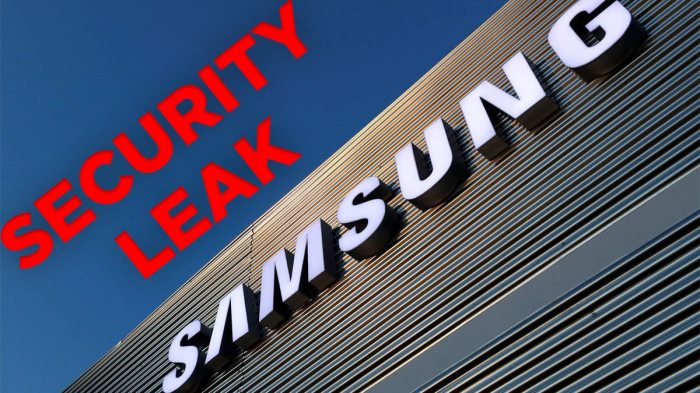Samsung want tighter security leaks – Samsung wants tighter security leaks. Recent breaches have exposed sensitive data, impacting brand reputation and customer trust. This isn’t just about fixing vulnerabilities; it’s about rebuilding confidence in a market saturated with competitors like Apple and Google, each boasting robust security postures. We’ll delve into Samsung’s current security measures, analyze the nature of recent leaks, and explore proposed enhancements to prevent future incidents.
From analyzing the methods used to infiltrate Samsung’s systems to examining the legal and regulatory implications of data breaches, we’ll uncover the complexities involved in securing a tech giant. We’ll also discuss the crucial role of consumer confidence and explore technological solutions, including advanced encryption and AI-powered security, that can bolster Samsung’s defenses. Finally, we’ll look at how improving internal processes and accountability can create a more resilient security ecosystem.
The Nature of Recent Leaks
Samsung, a titan in the tech world, has faced its share of security breaches recently. While the company has been quick to address these issues, understanding the nature of these leaks is crucial to grasping the broader implications for both Samsung and its customers. These incidents highlight the persistent challenge of safeguarding sensitive data in an increasingly interconnected digital landscape.
Recent leaks haven’t involved a single type of information. Instead, they’ve encompassed a disturbingly broad spectrum of sensitive data. This includes internal documents detailing product development strategies, source code for various software components, and even personal information of employees and customers. The specific details of each leak vary, but the common thread is the exposure of confidential information that could be exploited for malicious purposes.
Impact on Brand Reputation and Customer Trust
The fallout from these security breaches extends far beyond the immediate loss of data. The potential impact on Samsung’s brand reputation and customer trust is significant. News of data leaks erodes consumer confidence, leading to potential loss of sales and market share. Customers may hesitate to purchase Samsung products if they believe their personal information is at risk. This damage to reputation can be long-lasting and difficult to repair, even with swift responses and remediation efforts. Consider the case of Equifax; their massive data breach in 2017 resulted in significant financial losses and lasting damage to their brand image, illustrating the high stakes involved.
Methods of Data Acquisition and Distribution
The methods used to obtain and distribute sensitive Samsung data are varied and often sophisticated. These range from simple phishing attacks targeting employees to more complex exploits targeting vulnerabilities in Samsung’s internal systems. Some breaches might involve insider threats, where individuals with access to sensitive information misuse their privileges. Once data is obtained, it’s often distributed through various channels, including underground online forums and dark web marketplaces. The anonymity offered by these platforms makes tracking down the perpetrators challenging, highlighting the complexity of addressing these issues. For instance, the use of advanced malware to gain unauthorized access to systems is a common tactic, requiring robust security measures to mitigate.
Legal and Regulatory Implications
Samsung’s recent security leaks have significant legal and regulatory implications, extending beyond reputational damage and financial losses. The company faces scrutiny under various national and international laws concerning data protection, intellectual property, and consumer rights. Understanding these frameworks is crucial for assessing the potential repercussions and devising effective preventative measures.
The legal landscape surrounding data breaches and intellectual property theft is complex and varies by jurisdiction. In the United States, laws like the California Consumer Privacy Act (CCPA), the Health Insurance Portability and Accountability Act (HIPAA) (if health data is involved), and various state breach notification laws dictate how companies must handle data breaches and notify affected individuals. The European Union’s General Data Protection Regulation (GDPR) applies to companies processing the personal data of EU residents, regardless of the company’s location, imposing stringent data protection standards and hefty fines for non-compliance. Similarly, other countries have their own data protection laws, adding layers of complexity to the legal ramifications for multinational corporations like Samsung. Intellectual property theft, meanwhile, is governed by national and international laws related to patents, trademarks, and trade secrets, with potential for both civil and criminal penalties.
Financial and Legal Repercussions for Samsung
The financial and legal repercussions Samsung faces are potentially substantial. Direct costs include expenses related to breach investigations, legal fees, notification costs to affected individuals, credit monitoring services, and potential payouts in class-action lawsuits. Indirect costs encompass reputational damage, loss of customer trust, decreased sales, and potential devaluation of the company’s stock. Legal repercussions could involve hefty fines under data protection regulations like the GDPR, which can amount to millions or even tens of millions of euros, depending on the severity of the breach and the number of individuals affected. Civil lawsuits from affected consumers seeking compensation for damages are also highly probable, adding to the financial burden. In extreme cases, criminal charges related to intellectual property theft could be filed, leading to even more severe penalties. For example, the Yahoo! data breaches resulted in significant fines and legal settlements, highlighting the potential scale of financial consequences for companies failing to adequately protect user data.
Potential Legal Actions by Samsung
To address future leaks and hold responsible parties accountable, Samsung can pursue several legal actions.
- Civil lawsuits against individuals or organizations responsible for the leaks: This involves pursuing legal action to recover damages and deter future attacks. Samsung could seek compensation for financial losses, legal fees, and reputational harm.
- Criminal complaints against perpetrators: If evidence suggests malicious intent or criminal activity, Samsung can file criminal complaints with law enforcement agencies to investigate and prosecute the individuals or groups responsible.
- Strengthening internal security measures and compliance programs: While not a direct legal action, proactively enhancing security protocols and implementing robust compliance programs demonstrates a commitment to data protection and minimizes future legal risks. This can include investing in advanced security technologies, employee training, and regular security audits.
- Collaboration with law enforcement and cybersecurity agencies: Working closely with authorities can provide valuable insights into the nature of the attacks, identify perpetrators, and contribute to broader efforts to combat cybersecurity threats.
- Seeking injunctions to prevent further leaks: In certain cases, Samsung may seek court orders to prevent the further disclosure of sensitive information.
Technological Solutions: Samsung Want Tighter Security Leaks
Samsung’s recent security breaches highlight the urgent need for robust technological safeguards. Moving beyond reactive measures, a proactive, multi-layered approach incorporating advanced encryption, intrusion detection, and cutting-edge security technologies is crucial to safeguarding sensitive data and maintaining consumer trust. This requires a significant investment in both infrastructure and expertise.
Advanced encryption techniques are paramount in protecting Samsung’s sensitive data. This goes beyond simply encrypting data at rest; it involves implementing end-to-end encryption for all communications, utilizing strong cryptographic algorithms resistant to known attacks, and employing key management systems that ensure the secure storage and rotation of encryption keys. For example, implementing AES-256 encryption for all data at rest and in transit, coupled with a robust key management system using hardware security modules (HSMs), significantly enhances data protection. This prevents unauthorized access even if a device or system is compromised.
Proactive Security Measures, Samsung want tighter security leaks
Implementing proactive security measures is as important as reactive ones. A robust security posture necessitates continuous monitoring and threat prevention. This includes deploying intrusion detection systems (IDS) and intrusion prevention systems (IPS) to monitor network traffic for malicious activity, and regularly conducting vulnerability assessments and penetration testing to identify and remediate security weaknesses before they can be exploited. For instance, a well-configured IDS can detect suspicious network patterns indicative of a data breach attempt, allowing for immediate response and mitigation. Similarly, penetration testing simulates real-world attacks to uncover vulnerabilities in systems and applications.
Comparison of Security Technologies
Several advanced technologies offer significant potential for enhancing Samsung’s security posture. Blockchain technology, with its immutable ledger, could be used to create a transparent and auditable record of data access and modifications, reducing the risk of unauthorized changes. AI-powered security systems offer the potential for real-time threat detection and response, analyzing vast amounts of data to identify anomalies and potential attacks that might be missed by traditional methods. For example, an AI-powered system could learn to identify patterns associated with specific types of attacks, such as phishing attempts or malware infections, and automatically block them. The combination of these technologies creates a layered defense, providing multiple lines of protection against data breaches. However, implementing and managing these sophisticated systems requires significant investment in specialized expertise and infrastructure.
Ultimately, Samsung’s journey towards tighter security isn’t just about patching holes; it’s about a fundamental shift in mindset. By combining advanced technology with improved internal processes and a commitment to transparency, Samsung can regain consumer trust and solidify its position as a leader in the tech industry. The fight against data breaches is ongoing, but with proactive measures and a dedication to security, Samsung can emerge stronger and more secure.
Samsung’s cracking down on leaks – they’re serious about protecting their upcoming releases. This heightened security focus makes you wonder about the tech maintenance protocols of other giants, like the meticulous care detailed in this article on Japan Airlines and Finnair’s iPhone and iPad Pro maintenance. It highlights how crucial robust security and maintenance are across industries, echoing Samsung’s current priorities.
 Insurfin Berita Teknologi Terbaru
Insurfin Berita Teknologi Terbaru

